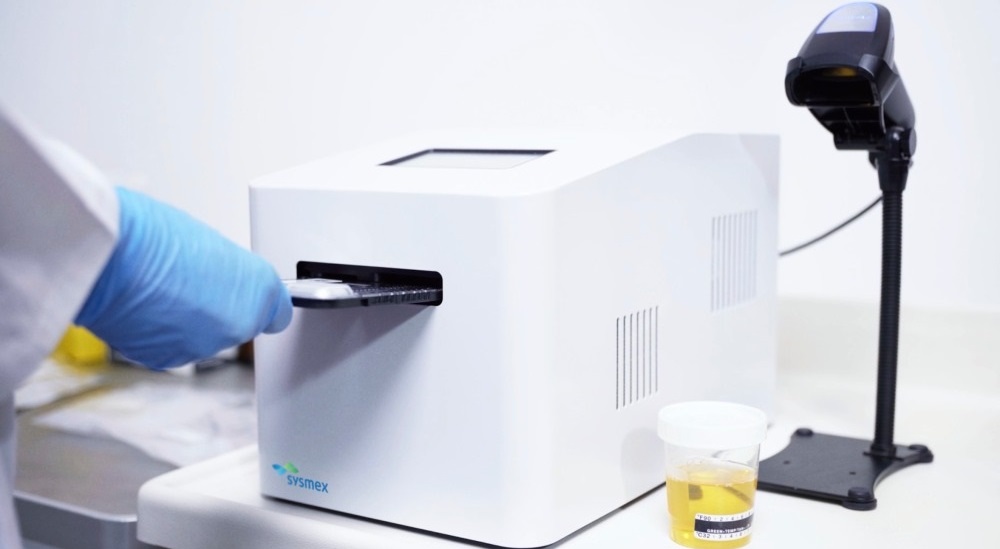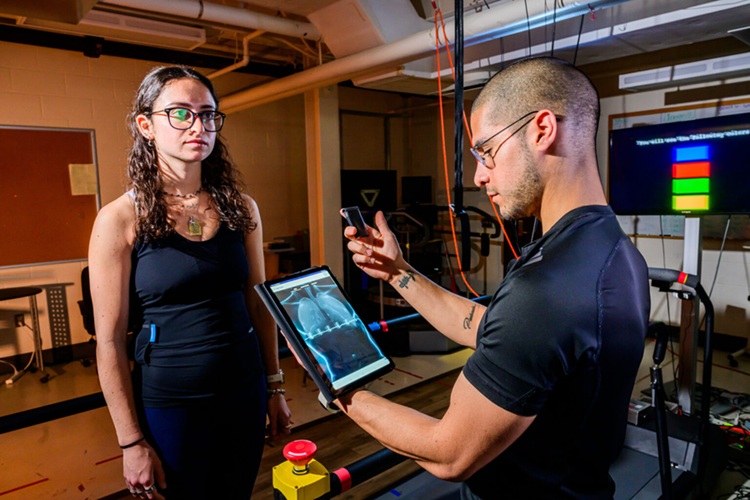Rapid UTI Test Cuts Detection Time from 3 days to 45 Minutes
|
By HospiMedica International staff writers Posted on 17 Jun 2024 |

Antimicrobial Resistance (AMR), also known as antibiotic resistance or superbugs, is a silent but growing pandemic where bacteria have become resistant to lifesaving antibiotics due to decades of overuse and misuse. In 2019, AMR was responsible for nearly 1.3 million deaths worldwide and is projected to cause 10 million deaths annually by 2050. Urinary Tract Infections (UTIs) are among the most prevalent bacterial infections, with 50-60% of women experiencing a UTI in their lifetime, and one in ten women aged 18 and over-reporting at least one presumed UTI each year. Moreover, up to half of the bacteria causing these infections have developed resistance to at least one antibiotic. Now, a groundbreaking test promises to revolutionize UTI treatment by bringing advanced laboratory testing capabilities directly into the doctor’s office.
The PA-100 AST System, developed by Sysmex Astrego AB (Uppsala, Sweden), is a cutting-edge diagnostic tool that can detect a bacterial infection in just 15 minutes and determine the appropriate antibiotic for treatment within 45 minutes. This system utilizes a small (400 microliter/less than half a milliliter) urine sample placed on a smartphone-sized cartridge. The cartridge, equipped with a nanofluidic chip, is loaded into an analyzer unit roughly the size of a shoebox, which then reads the sample at a cellular level. Designed for use in doctor’s offices, the analyzer is fully automatic and requires no maintenance. Its rapid testing capability is a significant improvement over traditional methods, which can take days to culture bacteria and determine antimicrobial susceptibility. This rapid, accurate diagnosis of bacterial infections enables doctors and healthcare workers to precisely target antibiotic use, which will help curb the spread of antibiotic-resistant infections, enhancing healthcare and saving lives.
This represents the first time a point-of-care test can identify specific infections and their susceptibility to particular antibiotics by monitoring how an infection responds to various drugs in real time (a phenotypic test). It supports doctors and health workers in their clinical decision-making at the point of care and opens up the significant possibility of previously “retired” first-line antibiotics coming back into use for the majority of patients. Roughly 25-30% of patients have infections resistant to older first-line antibiotics which have been retired as a result; this means the remaining 70-75% of patients could still benefit from those older drugs. Since the PA-100 AST System identifies which specific antibiotic can treat an infection, it will likely allow retired antibiotics to be brought back into service because the test is able to demonstrate when an infection is susceptible to their effects.
The PA-100 AST System envisions a future where patients receive quick, accurate diagnoses and appropriate treatments during a single doctor’s visit. Sysmex Astrego recently received one of the UK's most prestigious science awards, the “Longitude Prize on AMR,” for developing the PA-100 AST System, which was launched in the European market in June 2023. The Longitude Prize on AMR was established in 2014 to encourage the development of new diagnostic tests that can quickly determine if an infection is bacterial and identify the correct antibiotic, thereby reducing the typical 2-3 day lab test delay and ending the prevalent "just in case" prescribing that contributes to the rise of antibiotic resistance. This award-winning test paves the way for future technologies that could transform how infections are diagnosed and treated, extending beyond UTIs to potentially include blood and sputum tests for other infections.
“The PA-100 AST System challenges bacteria present in a patient’s urine with microscopic quantities of antibiotics in tiny channels embedded in a cartridge the size of a smartphone. We rapidly pinpoint whether a bacterial infection is present and identify which antibiotic will actually kill the bugs, guiding doctors only to prescribe antibiotics that will be effective,” said Mikael Olsson, CEO and co-founder, Sysmex Astrego. “We have already started rolling out the test in Europe, we’re running studies in surgeries across the UK and working with regulators to secure additional approvals. The GBP 8 million prize will support us to tailor the test for use with different kinds of UTIs and antibiotics, speeding up access for more patients.”
Related Links:
Sysmex Astrego AB
Latest Point of Care News
Channels
Critical Care
view channel
Novel Intrabronchial Method Delivers Cell Therapies in Critically Ill Patients on External Lung Support
Until now, administering cell therapies to patients on extracorporeal membrane oxygenation (ECMO)—a life-support system typically used for severe lung failure—has been nearly impossible.... Read more
Generative AI Technology Detects Heart Disease Earlier Than Conventional Methods
Detecting heart dysfunction early using cost-effective and widely accessible tools like electrocardiograms (ECGs) and efficiently directing the right patients for more expensive imaging tests remains a... Read more
Wearable Technology Predicts Cardiovascular Risk by Continuously Monitoring Heart Rate Recovery
The heart's response to physical activity is a vital early indicator of changes in health, particularly in cardiovascular function and mortality. Extensive research has demonstrated a connection between... Read more
Wearable Health Monitoring Device Measures Gases Emitted from and Absorbed by Skin
The skin plays a vital role in protecting our body from external elements. A key component of this protective function is the skin barrier, which consists of tightly woven proteins and fats that help retain... Read moreSurgical Techniques
view channel
Intravascular Imaging for Guiding Stent Implantation Ensures Safer Stenting Procedures
Patients diagnosed with coronary artery disease, which is caused by plaque accumulation within the arteries leading to chest pain, shortness of breath, and potential heart attacks, frequently undergo percutaneous... Read more
World's First AI Surgical Guidance Platform Allows Surgeons to Measure Success in Real-Time
Surgeons have always faced challenges in measuring their progress toward surgical goals during procedures. Traditionally, obtaining measurements required stepping out of the sterile environment to perform... Read morePatient Care
view channel
Portable Biosensor Platform to Reduce Hospital-Acquired Infections
Approximately 4 million patients in the European Union acquire healthcare-associated infections (HAIs) or nosocomial infections each year, with around 37,000 deaths directly resulting from these infections,... Read moreFirst-Of-Its-Kind Portable Germicidal Light Technology Disinfects High-Touch Clinical Surfaces in Seconds
Reducing healthcare-acquired infections (HAIs) remains a pressing issue within global healthcare systems. In the United States alone, 1.7 million patients contract HAIs annually, leading to approximately... Read more
Surgical Capacity Optimization Solution Helps Hospitals Boost OR Utilization
An innovative solution has the capability to transform surgical capacity utilization by targeting the root cause of surgical block time inefficiencies. Fujitsu Limited’s (Tokyo, Japan) Surgical Capacity... Read more
Game-Changing Innovation in Surgical Instrument Sterilization Significantly Improves OR Throughput
A groundbreaking innovation enables hospitals to significantly improve instrument processing time and throughput in operating rooms (ORs) and sterile processing departments. Turbett Surgical, Inc.... Read moreHealth IT
view channel
Printable Molecule-Selective Nanoparticles Enable Mass Production of Wearable Biosensors
The future of medicine is likely to focus on the personalization of healthcare—understanding exactly what an individual requires and delivering the appropriate combination of nutrients, metabolites, and... Read more
Smartwatches Could Detect Congestive Heart Failure
Diagnosing congestive heart failure (CHF) typically requires expensive and time-consuming imaging techniques like echocardiography, also known as cardiac ultrasound. Previously, detecting CHF by analyzing... Read moreBusiness
view channel
Expanded Collaboration to Transform OR Technology Through AI and Automation
The expansion of an existing collaboration between three leading companies aims to develop artificial intelligence (AI)-driven solutions for smart operating rooms with sophisticated monitoring and automation.... Read more

















